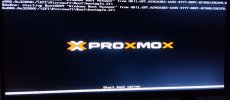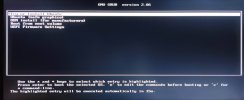My system specs:
HP Elitedesk 705 G4 sff
Ryzen 2004G
8gb RAM DDR4 2666
512GB SSD NVME
GPU: R7 430 2G OEM
My idea is upgrade to a rx 6400, but i need confirm if its works.
Proxmox VE 7.2-11
VM: W11 pro.
I then created a new VM and carefully worked through all the steps here, here and here. Passthrough actually seems to be working because I can complete a Windows installation and even boot into the OS using HDMI out from the GPU, however as soon as I enable network connectivity and Windows update installs the AMD GPU driver the system locks up. Starting the guest after GPU drivers are installed may freeze the host and require a reset or the guest can't boot and stops at this (always shows the spinning "stars" but only sometimes shows the EFI boot messages).
Confim my configs:
AND, the end:
I tried several different ways, I tried reinstalling the guest, I also tried changing some kernel and guest boot flags, none of them worked. I really want help
HP Elitedesk 705 G4 sff
Ryzen 2004G
8gb RAM DDR4 2666
512GB SSD NVME
GPU: R7 430 2G OEM
My idea is upgrade to a rx 6400, but i need confirm if its works.
Proxmox VE 7.2-11
VM: W11 pro.
I then created a new VM and carefully worked through all the steps here, here and here. Passthrough actually seems to be working because I can complete a Windows installation and even boot into the OS using HDMI out from the GPU, however as soon as I enable network connectivity and Windows update installs the AMD GPU driver the system locks up. Starting the guest after GPU drivers are installed may freeze the host and require a reset or the guest can't boot and stops at this (always shows the spinning "stars" but only sometimes shows the EFI boot messages).

Confim my configs:
Code:
# cat /etc/default/grub
GRUB_DEFAULT=0
GRUB_TIMEOUT=5
GRUB_DISTRIBUTOR=`lsb_release -i -s 2> /dev/null || echo Debian`
GRUB_CMDLINE_LINUX_DEFAULT="quiet amd_iommu=on iommu=pt video=vesafb:off,efifb:off"
GRUB_CMDLINE_LINUX=""
# Some other commented lines
Code:
# dmesg | grep -e DMAR -e IOMMU
[ 1.342720] pci 0000:00:00.2: AMD-Vi: IOMMU performance counters supported
[ 1.343421] pci 0000:00:00.2: AMD-Vi: Found IOMMU cap 0x40
[ 1.344279] perf/amd_iommu: Detected AMD IOMMU #0 (2 banks, 4 counters/bank).
[ 6.300524] AMD-Vi: AMD IOMMUv2 loaded and initialized
Code:
# cat /etc/modules
vfio
vfio_iommu_type1
vfio_pci
vfio_virqfd
Code:
# dmesg | grep 'remapping'
[ 1.343427] AMD-Vi: Interrupt remapping enabled
Code:
# cat /etc/modprobe.d/iommu_unsafe_interrupts.conf
options vfio_iommu_type1 allow_unsafe_interrupts=1
Code:
# find /sys/kernel/iommu_groups/ -type l
/sys/kernel/iommu_groups/7/devices/0000:00:18.3
/sys/kernel/iommu_groups/7/devices/0000:00:18.1
/sys/kernel/iommu_groups/7/devices/0000:00:18.6
/sys/kernel/iommu_groups/7/devices/0000:00:18.4
/sys/kernel/iommu_groups/7/devices/0000:00:18.2
/sys/kernel/iommu_groups/7/devices/0000:00:18.0
/sys/kernel/iommu_groups/7/devices/0000:00:18.7
/sys/kernel/iommu_groups/7/devices/0000:00:18.5
/sys/kernel/iommu_groups/5/devices/0000:0c:00.0
/sys/kernel/iommu_groups/5/devices/0000:00:08.0
/sys/kernel/iommu_groups/5/devices/0000:0c:00.3
/sys/kernel/iommu_groups/5/devices/0000:00:08.1
/sys/kernel/iommu_groups/5/devices/0000:0c:00.2
/sys/kernel/iommu_groups/3/devices/0000:00:04.0
/sys/kernel/iommu_groups/1/devices/0000:00:02.0
/sys/kernel/iommu_groups/6/devices/0000:00:14.3
/sys/kernel/iommu_groups/6/devices/0000:00:14.0
/sys/kernel/iommu_groups/4/devices/0000:0b:00.2
/sys/kernel/iommu_groups/4/devices/0000:0b:00.0
/sys/kernel/iommu_groups/4/devices/0000:00:07.0
/sys/kernel/iommu_groups/4/devices/0000:0b:00.3
/sys/kernel/iommu_groups/4/devices/0000:00:07.1
/sys/kernel/iommu_groups/2/devices/0000:00:03.1
/sys/kernel/iommu_groups/2/devices/0000:0a:00.0
/sys/kernel/iommu_groups/2/devices/0000:00:03.0
/sys/kernel/iommu_groups/2/devices/0000:0a:00.1
/sys/kernel/iommu_groups/0/devices/0000:03:00.0
/sys/kernel/iommu_groups/0/devices/0000:02:00.2
/sys/kernel/iommu_groups/0/devices/0000:00:01.2
/sys/kernel/iommu_groups/0/devices/0000:02:00.0
/sys/kernel/iommu_groups/0/devices/0000:00:01.0
/sys/kernel/iommu_groups/0/devices/0000:03:06.0
/sys/kernel/iommu_groups/0/devices/0000:01:00.0
/sys/kernel/iommu_groups/0/devices/0000:06:00.4
/sys/kernel/iommu_groups/0/devices/0000:06:00.2
/sys/kernel/iommu_groups/0/devices/0000:03:05.0
/sys/kernel/iommu_groups/0/devices/0000:06:00.0
/sys/kernel/iommu_groups/0/devices/0000:02:00.1
/sys/kernel/iommu_groups/0/devices/0000:03:01.0
/sys/kernel/iommu_groups/0/devices/0000:03:04.0
/sys/kernel/iommu_groups/0/devices/0000:03:07.0
/sys/kernel/iommu_groups/0/devices/0000:06:00.3
/sys/kernel/iommu_groups/0/devices/0000:00:01.4
/sys/kernel/iommu_groups/0/devices/0000:06:00.1
Code:
# cat /etc/modprobe.d/vfio.conf
options vfio-pci ids=1002:6611,1002:aab0 disable_vga=1
Code:
# cat /etc/modprobe.d/blacklist.conf
blacklist radeon
blacklist nouveau
blacklist nvidia
Code:
# cat /etc/modprobe.d/vfio.conf
options vfio-pci ids=1002:6611,1002:aab0 disable_vga=1AND, the end:
Code:
# cat /etc/pve/qemu-server/100.conf
#machine%3A pc-q35-7.0
#machine%3A q35
acpi: 0
agent: 1
args: -cpu 'host,+kvm_pv_unhalt,+kvm_pv_eoi,hv_vendor_id=NV43FIX,kvm=off'
balloon: 1024
bios: ovmf
boot: order=scsi0;ide2;net0;ide0
cores: 16
cpu: host,hidden=1,flags=+pcid
efidisk0: local-lvm:vm-100-disk-0,efitype=4m,pre-enrolled-keys=1,size=4M
hostpci0: 0000:0a:00,pcie=1,x-vga=1
ide0: local:iso/virtio.iso,media=cdrom,size=519030K
ide2: local:iso/windows11.iso,media=cdrom,size=5155160K
kvm: 1
machine: pc-q35-7.0
memory: 6096
meta: creation-qemu=7.0.0,ctime=1664816339
name: Win11
net0: e1000=56:DE:A4:5C:15:D3,bridge=vmbr0,firewall=1
numa: 0
ostype: win11
scsi0: local-lvm:vm-100-disk-1,size=132G
scsihw: virtio-scsi-pci
smbios1: uuid=71a27d78-c631-4570-8540-dfe9376ed4b2
sockets: 1
tpmstate0: local-lvm:vm-100-disk-2,size=4M,version=v2.0
vmgenid: f6a23745-fa77-4712-a341-5381ab04f43fI tried several different ways, I tried reinstalling the guest, I also tried changing some kernel and guest boot flags, none of them worked. I really want help




